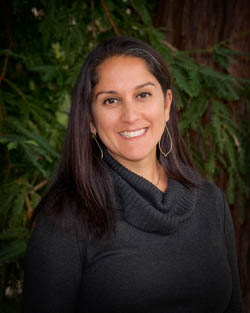Campus News
UCSC environmental governance expert named to NASEM committee addressing methane gas emissions
Environmental Studies Professor Sikina Jinnah has been appointed as a member of the National Academy of Sciences, Engineering, and Medicine (NASEM) Committee for Atmospheric Methane Removal to assess viable technological options for reducing a powerful greenhouse gas.

Environmental Studies Professor Sikina Jinnah has been appointed as a member of the National Academy of Sciences, Engineering, and Medicine (NASEM) Committee for Atmospheric Methane Removal to assess viable technological options for reducing a powerful greenhouse gas.
While carbon dioxide is often the focus of greenhouse gas emissions reduction strategies, methane is more than 25 times as potent as carbon dioxide at trapping heat in the Earth’s atmosphere, according to the U.S. Environmental Protection Agency (EPA). The new committee, which met for the first time in Washington, D.C., in April, is tasked with developing a research agenda to address the critical issue of methane removal to combat climate change.
“The role of methane emissions in climate change is critically important, as is the timing of this report,” said Jinnah. “In contrast to some other climate intervention strategies, where technology development has gotten out ahead of assessment of equity and justice, this committee’s report will be an early intervention and an opportunity to ensure science and justice goals are developed in tandem.”
In November 2021, the U.S. joined a global pledge to reduce methane emissions by at least 30% below 2020 levels by 2030. The reduction is a vital component of the Paris Agreement, which aims to limit global warming to a maximum of 1.5°C.
The committee’s goal is to develop a research program that will bring to light critical questions for governance in emerging technologies for methane removal and anticipate its future developments.
“We are at an early stage of methane removal technology development and the right moment to be thoughtful and considered about prioritizing research that may yield climate response options that are both effective and equitable. It’s crucial that we respond to environmental justice concerns in a proactive rather than reactive manner,” said Jinnah.
Jinnah, who co-chairs Harvard University’s Advisory Committee for the Stratospheric Controlled Perturbation Experiment (SCoPEx), was chosen in part due to her relevant experience in governance of other emerging technologies, such as solar geoengineering.
The ClimateWorks Foundation is sponsoring the NASEM committee’s work. They will meet monthly, and Jinnah will serve as a member for at least 18 months.